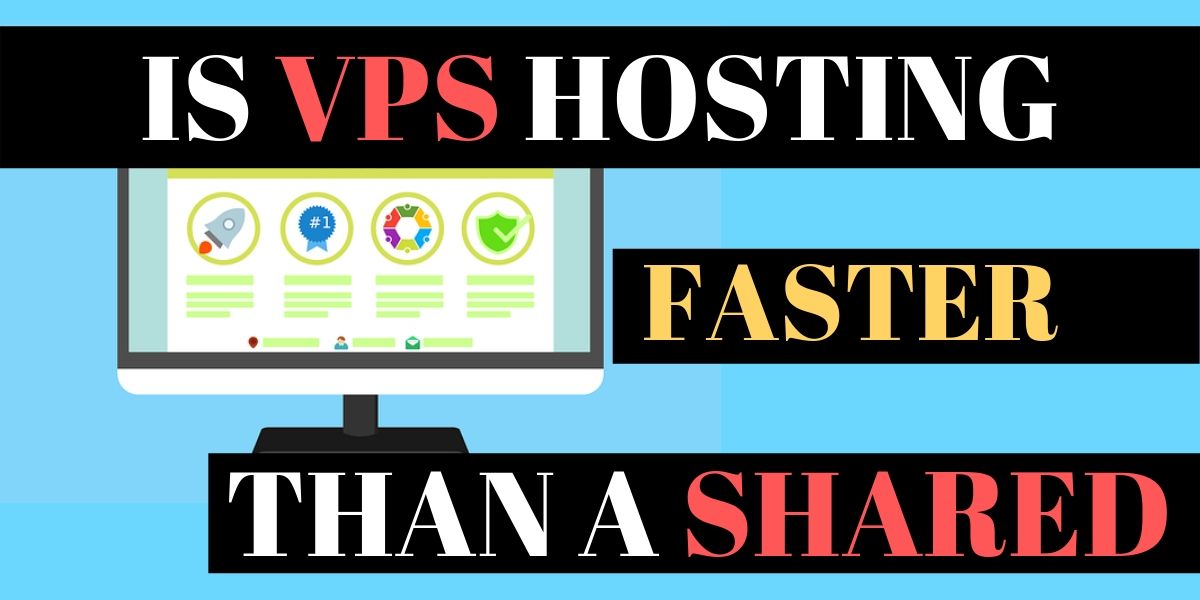Fast hosting is one of the main pillars of any successful online business. Whether you are starting a new blog or an e-commerce site, it is important to deliver the best possible user experience for your visitors.
Slow web host would negatively affect your bounce rate, and later on – overall SEO ranking.
When it comes to choosing a high speed hosting, you have 4 common choices: shared hosting, dedicated, cloud hosting, and a VPS hosting. In this article, we are going to figure out if a VPS hosting actually faster than the shared one.
We won’t be discussing a dedicated and cloud hosting here, as these are the more extensive topics, which deserve separate articles. But, we will do our best to explain the main differences between the shared and a VPS hosting.
This post would help you decide if you want to set up a more affordable but more limited shared, or a more expensive, yet more flexible – VPS hosting. We will also bring some examples of our favorite VPS hosting providers.
What a VPS hosting is and why it is that fast?
To understand what a VPS hosting is, first let’s unwrap the abbreviation. VPS stands for the Virtual Private Server. This type of hosting acts as a medium between the shared hosting and a dedicated one. It nicely combines the best parts of both.
Virtual Private Server is essentially a virtual machine with a real Operating System, which runs as a part of a physical machine. Think of a VPS as a separate apartment in a block building. The block building here is a real physical dedicated server.

VPS as a Virtual OS in a Dedicated Server
You are having a real, full-fledged server hardware, which is evenly shared between multiple VPS hosting clients. Entire dedicated server hardware is divided to a smaller servers that operate independently. A piece of this pie is allocated for your site.
To some extent, you can think of a VPS as a special implementation of a dedicated server. With that said, you are not getting a single physical server node. You rather share the single dedicated server’s hardware with other VPS clients.
The key difference between shared and VPS plan, is a VPS hosting provides you with precisely allocated hardware resources. Here is what you are getting with a VPS:
- a specific amount of RAM (2 GB, 4 GB, 8 GB and so on)
- certain amount of a CPU speed (measured in GHz)
- fixed amount of a storage space (10 GB, 20 GB , 50 GB and more)
- specific amount of bandwidth, which is only utilized by your site (this affects on how many users can visit your site every month)
- ability to choose a type of Operating System
- root access to your environment
What does all, mentioned above, mean for you? Well, you are basically getting a virtual copy of a dedicated server.
Don’t be in doubt of the word “copy” in here. Nowadays, virtualization technologies have advanced to an extent so the difference between a real physical server and an emulated Virtual Private Server is hard to notice.
Why is VPS so fast?
Since you are the only one who is using a specific VPS account, your speed is not affected by other hosting clients. You will always have a predefined size of RAM, storage, and CPU power. Bandwidth is also only used by your sites. That’s why you are getting much better performance, compared to a shared plan.
This level of freedom of customization is really amazing. You can choose the OS you wish to run for your server, the type of server software, and a lot of other parameters. Though, you need to be tech savvy to solve the issues you will face during the setup. It is also easy to break staff, so you must be careful. This can be a downside of a VPS.
The Good News is – there is a lot of hosting providers that offer a managed VPS plan. This means the company would set up everything for you. All you need to do is to just set up your site via cPanel or a Plesk.
What is the key difference between shared and VPS hosting?
Now, let’s reveal the main traits that differ a VPS vs a shared hosting. As we have figured out already, VPS hosting can also be considered a shared, since you are sharing a single dedicated server’s resources with other clients. But, why these two “shared” hosting plans are still very different?
Here are the main distinctions of a VPS, compared to a shared hosting plan:
- Shared hosting runs on a single server (physical or virtual), and is evenly partitioned between all the users. In case of a VPS, there is a separate, isolated virtual machine with an OS running on it. This OS is only meant for your site(s).
- VPS hosting provides much more security for every single client. This is because every client is completely separated from the others. This means, in case one of other VPS user falls a victim of a hacker, or simply installs a malicious software on their environment, your site remains intact.
- When using a shared hosting plan, you are inevitably going to be affected by other customers’ sites. Let’s assume one of the web sites, which is hosted on the same shared server with you, is getting a sudden spike in traffic. In case of a shared hosting, your site’s speed would certainly drop. This would never happen with a VPS hosting. Every customer is getting a separate environment for their web-site, without affecting others.
- VPS hosting grants a complete access to a virtual OS with all the admin privileges. That means you can install and remove any software you wish like if it was a real computer on your desk. You can open and close the ports via Firewall, and install different types of web-server software (Apache, NGINX, IIS, e.t.c.).
- With VPS you can even install other type of online services, not just a web-site. It can be a video streaming service, or a game server.
- You are getting a certain amount of hardware power under your VPS account. Depending on a plan you choose, you will get more or less amount of RAM, CPU speed, and a storage space.
- Bandwidth is measured in the amount of data (GBs or TBs, depending on your provider), so you can control how much data you want your visitors to utilize monthly. This bandwidth is specifically assigned to your VPS account, and is not wasted by other hosting clients.
- Another big difference between the shared and a VPS hosting, is you are getting a certain amount of dedicated IP addresses with a VPS. This option is not available with a shared plan.
- Last but not least, VPS hosting allows you to choose which Operating System you want to be using (Linux, Windows Server). This option is not available on any of the shared hosting plans, since all the clients are sharing the same OS that was set-up by a hosting company.
Is VPS hosting similar to a dedicated one? Which one is faster?
When speaking of a difference between a VPS and a dedicated hosting, it becomes hard to understand the difference.
Both types of hosting offer an isolated OS with allocated hardware resources.
With that said, there is only one significant difference (besides the price). Dedicated hosting – is a physical server machine that you are renting. It is not shared between you and other clients at all. So a dedicated hosting – is the only exclusive type of hosting you can get.
While VPS runs the virtual OS inside the physical server machine, dedicated hosting – is the server machine itself. If you prefer the analogy of a block house and an apartment, renting a dedicated server is the same as renting the entire block building.
In most cases a dedicated server is going to be faster than the VPS. One reason for that, is because a physical machine would be somewhat faster compared to a virtual.
Another, more important reason for a dedicated hosting to be faster, is in general, even the cheapest dedicate plan would have more hardware resources installed.
Obviously, this luxury comes with much higher price, so you need to weigh all the pros and cons before choosing the dedicated plan. This type of hosting would work for an establish company that offers a SaaS product to hundreds of thousands of customers.
How fast a VPS hosting is, compared to a shared one?
There can be multiple factors that affect a hosting speed. One of the main reasons for slow site performance – is an overloaded shared hosting server. While most of the experienced hosting providers do limit the amount of shared clients on a single server, your site might still outgrow even the most advanced shared plan.
When having a properly installed shared server and a VPS one, you will always get much better performance with a VPS hosting plan.
The reason for that is simple to figure out, having the differences between both types of hosting explained above.
Since the shared hosting is a single server with multiple clients on it, the amount of bandwidth and CPU usage has to be adjusted evenly between all the clients. This is due to limitations of a single server node.
Hosting company can not allow to exceed the server resources on a shared plan.
That’s overall performance by every single shared hosting site can be negatively affected by a single client of the same server. In case one or more sites that share the same hosting, has high resource consumption, your site is going to be affected.
Simply put: your site won’t be working in full speed, and might experience a significant downtime because of other person’s site is overloading the server.
This situation never happens to a VPS hosting clients. This is why the VPS plans are considerably more expensive than shared ones. Nevertheless, VPS offers a really fast site speed in contrast to a shared hosting plan.
Can shared hosting be faster than a VPS?
When dealing with a VPS hosting, there are two options: managed VPS hosting, and unmanaged one.
If you are tech savvy, or having a hosting setup engineer at your side, it is OK to choose the unmanaged plan. With this plan, you will have to be responsible for the entire server setup, but you really have to know what you are doing. This will also help to save some money, as managed VPS is more expensive.
With that in mind, there is a chance of improperly configured VPS hosted web-site to perform slower than a shared hosted site with the same provider.
Every trusted hosting company has a professional staff to handle all the server setup routines. They are responsible for doing everything properly.
In case of a VPS hosting, you should always choose the managed plan, so the provider would set every critical part up for you. Otherwise, you need to understand the technical details of the proper web server setup, or hire a professional.
So to summarize: poorly configured VPS hosting server can perform slower than a properly set-up shared hosting.
How can you speed-up a non VPS web-site?
Sometimes, you don’t have to switch from a shared to a VPS hosting to gain more site speed. You can easily speed-up your site, without upgrading to a more expensive hosting plan.
Some of the recommended ways to speed up a web-site, are the following (critical steps are in bold):
- first and foremost – Reduce the size of your images and the amount of pictures on a single web-page
- split long pages into sub-pages (5,000 words page can be split into 2 or 3 pages of 1,500 – 2,500 words each)
- utilize caching technology (once a page is visited, it is saved into a cache, so later on it loads faster)
- remove unnecessary JavaScript from your pages (or try to load the scripts asynchronously)
- minify the CSS and JS files
- reduce the amount of redirects on your pages
- reduce the number of external resources loaded to your page
- utilize a lazy image load techniques
- replace the YouTube video embeds with simple images
- use the site speed tests tools like: GtMetrix, or a PageSpeed Insights by Google
Steps, suggested above, are easier to achieve if using a WordPress CMS, thanks to plugins.
When should you go with a VPS and when should you go with a shared hosting?
Depending on your sites’ traffic, you might consider upgrading to a more advanced shared hosting plan, or switching to a VPS hosting.
It is not always clear where this switching point is. Someone recommends to go with a VPS when your site reaches 50,000 monthly visits. Others suggest so switch while having 30,000+. This numbers are pretty much individual. But there are some more useful indicators, and they are non-technical.
For those, who owns a blog, portfolio, or a forum web site. Basically any type of not directly commercial sites. It should be enough a medium shared hosting plan in most cases.
Of course, if you are having a lot of visitors daily (2,000 – 3,000 per day), you might start experiencing down-times.
Usually, you would receive a notice from your provider for exceeding the server resources. In that case, if you are already using a mid-tier shared hosting plan, you won’t save the situation by upgrading to a higher tier plan. This means, it’s time for you to upgrade to a VPS.
Many hosting providers would offer a site transfer service for free. So, they will move your site’s files from shared into a VPS hosting without interruptions for your visitors.
In case you are having an e-commerce site, or any other business site that is designed for selling stuff to people, you’re best bet is to got with a basic VPS hosting right away. This would save you the hustle of emergent transfer to a VPS, when you start loosing sales because of shared hosting limitations.
What are some of the fastest VPS hosting providers that are actually good?
There’s a bunch of specialized VPS hosting-only platforms out there. Those are the best, but they are the most expensive ones.
In contrast, most of the experienced shared hosting companies, currently also offer other types of hosting. Anything from BlueHost to InMotion would work just fine, if you are looking for a simple to use, affordable VPS plan.
To make it easier for you, we have compiled a list of the most decent and fastest providers that offer the VPS hosting plans:
- Bluehost
- A2 Hosting
- InMotion
- SiteGround (*Cloud VPS only)
- Dreamhost
- Digital Ocean (unmanaged VPS hosting only)
- GreenGeeks
- HostGator
- GoDaddy
Conclusion
I hope you’ve had enough of the education to be able to decide which type of hosting would perform faster, and which one suits best for your case.
VPS hosting is a very popular solution these days, and it keeps gaining popularity. While VPS is more expensive than the shared one, it offers greater control of things, and better site speed. It won’t break the bank in contrast to a dedicated server, which is significantly more expensive.
Kindly comment below, what you think of this information, and what was your experience with VPS and shared pans. Which provider offers the best VPS service in your opinion?



